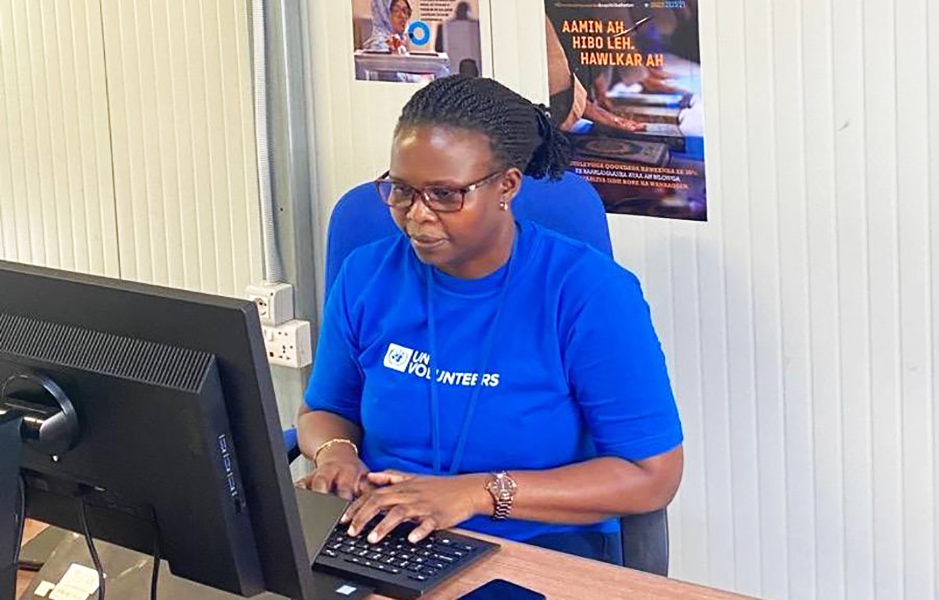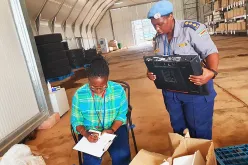Stella Apolot Epudu has been supporting electoral administration and management in Somalia, including ensuring the participation of women in the process. The international UN Volunteer from Uganda serves with the Integrated Electoral Support Group of the UN Mission in Somalia (UNSOM). On the occasion of the International Day of UN Peacekeepers, we interviewed Stella on her assignment. She shares how her experience and technical skills helped the Electoral Management Body deliver peaceful parliamentary elections for the Upper House and the House of the People in the country.
What are the key highlights of your assignment, and who do you interact with in your daily work?
In my role, I provided technical and logistical support and advice during the establishment of the National Independent Electoral Commission's branch, in Jubaland State, as well as the State Elections Implementation Team in charge of the 2021 elections. I conduct training and mentoring to national counterparts to enhance knowledge and acquisition of technical skills. I also coordinate advocacy activities for the campaign to attain a 30 per cent quota of women, which is pursued by the UN, Jubaland Administration and civil society organizations. Additionally, I monitor the electoral environment in the region to enhance informed decision making both at the regional and headquarters level.
How has your work impacted the people you serve?
Through a range of trainings and mentoring sessions conducted with my counterparts, I have been able to enhance the knowledge and skills of staff of the National Independent Electoral Commission, especially in election administration and management.
Through public awareness and advocacy campaigns created to enhance women’s participation in elections, and with the support of the UNSOM political office, the Jubaland Federal Member State increased women's representation in the Upper House. However, it was unable to maintain the same number of women elected to the House of the People in 2016, with eight women elected, compared to 10 in the previous parliament.
How does your UN host entity value your contributions?
The UN highly values UNV's contributions and many of its secretariat staff were former UN Volunteers. This is true for UNSOM as well, where I have benefited from capacity building opportunities, and have been trusted to serve as Officer in-charge of the regional office of the Integrated Electoral Support Group Regional Office. Like other personnel, UN Volunteers are provided with equal protection, under the UN Security Management System, as well as support services like accommodation, travel and welfare.
I am proud of Stella and other UN Volunteers working for IESG in Somalia. Stella has been assigned to do logistics responsibilities, but she has gone beyond these duties, building the capacity of national counterparts, and stepping in as the officer-in-charge during my absence as her supervisor. Stella and her other colleagues continue to make a massive contribution to the UN mandate in Somalia. --Stella's supervisor, Mr Humphrey Maluti, Electoral Officer
What have been your greatest challenges and lessons? How has COVID-19 impacted your work?
Notwithstanding the unpredictable security situation, working remotely was my major challenge, since some of my duties needed physical engagement with my national counterparts. But with the advancement of new technology and my computer skills I was able to engage my national counterparts virtually using virtual platforms. I was also able to provide capacity building support for staff of the National Independent Electoral Commission at the regional and national level.
To overcome the unprecedented challenges posed by the COVID-19 pandemic, I realized that one needs the ability to quickly adapt to the rapidly evolving operational requirements. In my case, innovation and creativity came in handy in ensuring that I delivered set targets within existing challenges. Working in close collaboration and coordination with other components of the mission is an essential approach to achieving unit goals and this was crucial in the context of COVID-19.
What is the one thing you are particularly proud of regarding their work?
The changing level of understanding of electoral administration and management among our National Independent Election Committee counterparts is so encouraging. Right from the establishment of the regional office in 2019, the staff demonstrated enthusiasm in learning, and I can proudly attest to the progressive ability of the body to independently conduct elections. This resulted from the trainings and mentoring sessions I regularly conducted with them. Similarly, we noted an improvement in the representation of women staffing of Electoral Management Body.
What are your thoughts about what it means to volunteer?
To me, being a volunteer means sharing my strengths and experiences with others to make a difference in their lives. I am therefore delighted to engage through volunteerism to share my knowledge and skills to impact others and put a smile on other people's faces. Above all, I am proud to be contributing to Sustainable Development Goal 16 on peace, justice and strong institutions, and thus make a difference in my country and in the world.


